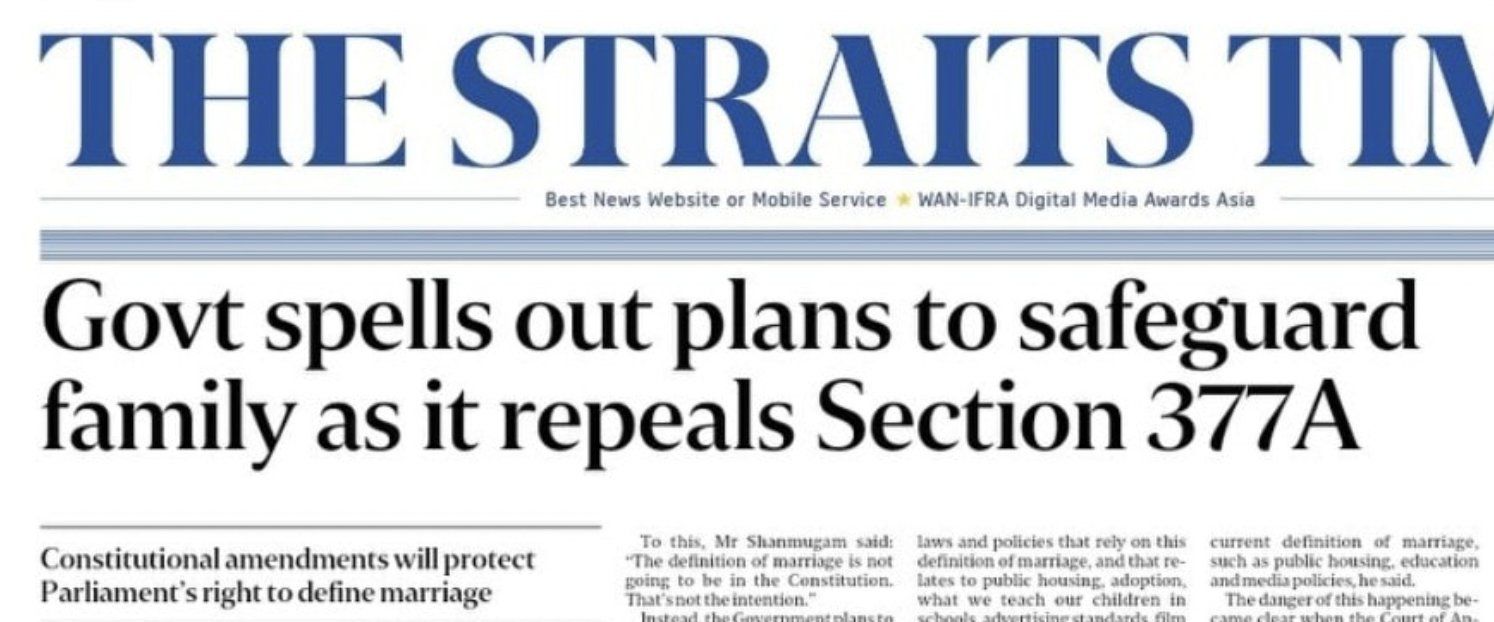Almost every day since the National Day Rally, I’ve been putting journalists in touch with LGBTQ activists to talk about the repeal of Section 377A. It’s given me the idea that I should keep a spreadsheet of contacts who can speak on a variety of Singapore-related issues. I don’t plan on publishing this spreadsheet, so people don’t have to worry about phone numbers or emails being published for all to see. My idea is that, if/when I get media requests, I can consult this list to see who might be a good fit for that particular subject matter. It also means that those on the list are people I already know are comfortable with being approached by the media and are okay with me passing their contacts on. If this sounds like a list you’d like to be on, fill in this form. (Note: Filling in the form alone doesn’t automatically mean that you’ll be in the list and that I’ll be referring journalists to you — I’ll be doing some level of checks/curation.)
Framing the repeal of Section 377A
The big news of the past week is of course the coming repeal of Section 377A. I wrote a special issue on this that was sent out to Milo Peng Funders earlier this week. The paywall on that issue is down for now but will go back up on Monday so you have this weekend to read it if you aren’t already a Milo Peng Funder! If you don’t want to worry about things like paywalls, then, ahem:
I would be much more cavalier about putting things behind paywalls, except I’m trying to be mindful of maintaining a clear distinction between free and paid subscriptions. For the reason why, read Potential Scenario #1 of this post.

Anyway, I’ve been keeping an eye on the rhetoric since I wrote that special issue. What concerns me about the framing of this repeal is all the talk about efforts to “protect” or “safeguard” marriage and families and “deal with cancel culture” just feeds the false impression that LGBTQ people and their struggle for equal rights is some sort of threat. This is dangerous because of how it could generate backlash against a community that’s already discriminated against, and having to deal with misconceptions and falsehoods that have been spread about them.
There’s a lot of call for moderation and unity and mutual respect. Of course no one wants it to escalate into violence or anything extreme, and democracy is often a messy process that requires lots of engagement and effort, but we can’t keep talking about this as if all sides are equal or are facing the same stakes. LGBTQ people are actually fighting for their rights, whereas progress in LGBTQ equality doesn’t actually threaten anyone’s marriage or family or religious freedom. People are not facing the same levels of oppression and their lives are not being affected in the same way. If we don’t recognise this distinction, we end up demanding that an oppressed group stay silent about their oppression just to maintain some facade of “harmony”, and that doesn’t make things better; it just adds on the burden to an already marginalised community and makes the injustice all the more unfair.
Having said all this, it’s also worth mentioning that while impactful from a human rights perspective, Section 377A was not the top concern of Singaporeans post-National Day Rally speech. Most of the 600 people polled by Milieu Insight ranked increase in cost of living as the top issue. I think all our bank accounts can relate. (Also has anyone been taking Grab lately because oh my tian is it ever not surge pricing?! 😵😵😵)
Workplace safety
On 24 August, The Straits Times reported that the workplace death toll for just this year alone has already hit 34. To give us some perspective, there were 37 such deaths recorded last year (which is terrible), and it’s only August now.
This death toll also includes a Bangladeshi worker who fell into the sea after part of a concrete pier at Keppel Shipyard collapsed on Monday. His body was recovered on Wednesday and he was pronounced dead by a paramedic at the scene. Work has stopped at the pier and an investigation into what happened is underway.
The number of workplace deaths — occurring at different worksites run by different companies, with workers from different contractors and sub-contractors — tells us that it can’t just be a problem with individual companies or workers. Some systemic change is needed. The Real Estate Developers’ Association of Singapore is suggesting to its members that they should pay safety bonuses to encourage contractors to adhere to good health and safety practices, but I think there’s so much more that we have to look at in terms of preventing exploitation and labour protections that don’t put workers in vulnerable and unsafe situations in the first place.
Take this case reported by Shin Min Daily News (in Mandarin) and picked up by Mothership.sg: a 42-year-old bus driver was sent to prison for 12 weeks — and got suspended from driving all types of vehicles for five years — after he feel asleep while driving and crashed. Three passengers were injured. In his defence, he said that he’d only got home at about 10pm the night before, went to bed at 11:30pm, and had to get up at 3:30am to start a 5:30am shift. SBS Transit claimed that their roster system gives their drivers at least nine hours of rest between shift, but there’s no real detail in the reporting that I could find so far about how that is calculated. Even if SBS Transit insists that he was given enough time between his shifts, were there things that he had to take care of even after he was technically off the clock that might have delayed him? And even if he didn’t, does the nine hours of “rest time” factor in the time that workers need to commute between work and home? If workers aren’t given enough time by their employers to rest, it’s not fair if they are made to take full responsibility when something goes wrong. As Shin Min reported, this former driver — he has since resigned from SBS Transit — is the breadwinner for his family, and has two children to care for.
Checking in on the neighbours
🇲🇾 Former Prime Minister Najib Razak has begun serving a 12-year jail term after losing his appeal against convictions related to the 1MDB corruption scandal. He also has to pay a 210 million ringgit fine (that’s about $65 million). He could file a review application — although lawyers say the threshold for such applications is high — or seek a pardon from the king. His supporters have actually already done the latter, although he hasn’t filed a petition himself yet. And that’s not all; he’s still got more court cases pending.
🇹🇭 The constitutional court has suspended Prayut Chan-o-cha from official duty as prime minster pending its deliberation of a petition to review whether he has reached the eight-year term limit for a prime minister, as stated in the Thai Constitution. He seized power in a coup in 2014, but his supporters claim that he has only been prime minister from either 2017 (when the current Constitution drafted by the military was implemented) or from the 2019 elections. Still, he says that he’s going to continue on as defence minister.
Breaking news: Jee Leong Koh just won the Singapore Literature Prize for English Fiction.
— Ng Yi-Sheng (@yishkabob) August 25, 2022
He announced (via his proxy Thow Xin Wei) that he'd donate the money to @tjc_singapore for the defence of death row inmates.
(2nd Minister of Law Edwin Tong is attending!) #singlitftw
Congratulations to Jee Leong Koh, who reads this newsletter, for winning Best Fiction in English at the Singapore Literature Prize this year! And also a big “THANK YOU!” for supporting TJC.

Thank you for reading this week! As always, please help me spread the word about this newsletter by sharing it widely.
